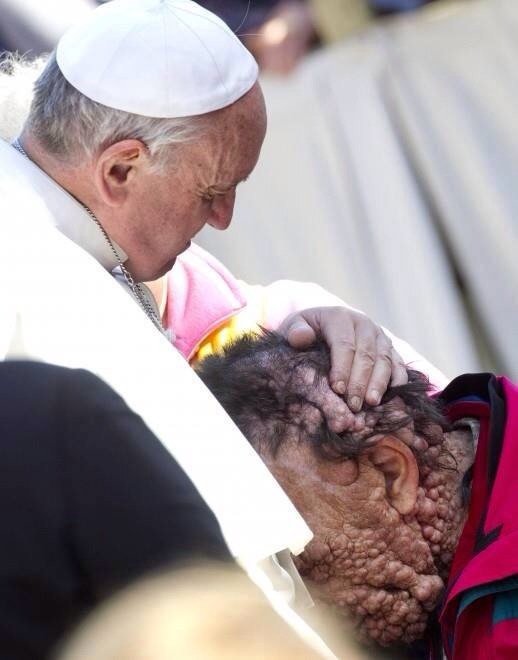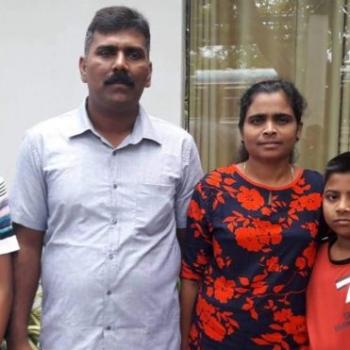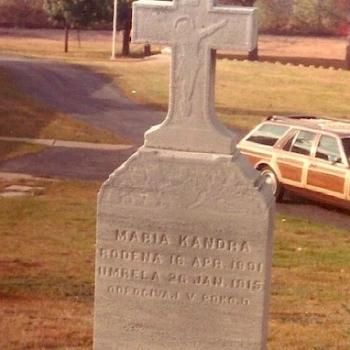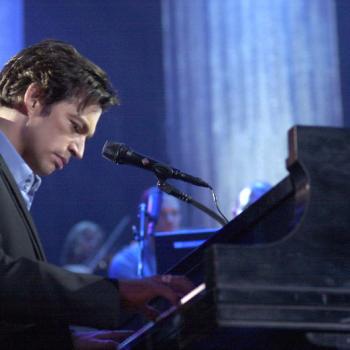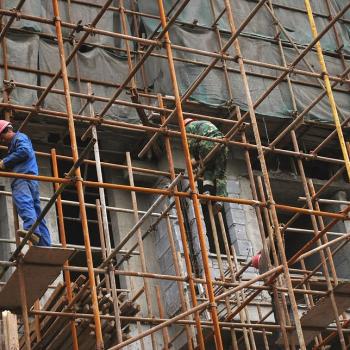It could easily qualify as the picture of the week—maybe, of the year.
Last Wednesday, making his way through the crowds after his general audience at the Vatican, Pope Francis caught sight of a man. This wasn’t just another face in the crowd. The man was seriously disfigured, his skin covered with tumors. It was later reported that he suffered from neurofibromatosis, a genetic disorder that causes pain and thousands of tumors throughout the body. It can also cause loss of vision and hearing, heart disease, and severe disability from nerve compression by tumors. There is no cure. It is a living nightmare, and often grotesque. It’s not easy to look at someone with this disorder.
But Wednesday, Pope Francis did more than look at this man.
When the pope caught sight of him, he reached out to touch him, pulling him closer. The man lowered his head, and the pope held it for a long moment and prayed over him. Then Pope Francis offered a final gift: he bent down to the man’s head, covered with tumors, and gave him a tender kiss.
This gesture from the Holy Father was captured by photographer Claudio Peri and transmitted around the world. It caused a sensation.
“Transcendent,” one writer called it. Another compared it to the famous story of the pope’s namesake, St. Francis, kissing the leper.
I was struck by one comment from an agnostic who said on Facebook: “Pope Francis is amazing. He loves his fellow man and it shows in everything he says and does. Religious or not, isn’t that what everyone wants in life?”
It is. And I think this powerful moment—so Christ-like, so compassionate, so human—can also offer us a way of looking at this Sunday’s gospel.
On one level, this account from Luke is a defense of the teaching about resurrection—with Jesus using the Sadducees own logic and understanding of Judaic law to teach them.
But on another level, this incident from Luke reveals something we might easily overlook: it is not just about what Christ teaches, but how. The great biblical commentator William Barclay wrote that this episode may seem, in his word, “arid.” It deals with questions of another time that really don’t relate to us today. But the point, he said, may be to convey another truth. There is something else at work here. St. Luke, you’ll remember, was the only evangelist who was not Jewish. He was writing, in part, to show the universality of the gospel message, how Christ brought his teaching to everyone. And William Barclay suggests this incident illustrates that. “Jesus,” he emphasized, “used arguments that the people he was arguing with could understand.” He talked to them in their own language.
In other words: he was willing to meet them where they were.
Which, in a very different context, is exactly what Pope Francis did on Wednesday.
What the world saw in that moment in St. Peter’s Square was an act of mercy, of love, of human contact that should humble and challenge all of us.
But he was also teaching by example—and doing what Jesus would do. It is what Jesus did with the blind and the crippled, the sinners and the seekers. It’s also what he did with the Sadducees. It is what he does with all of us.
He meets us where we are. He talks to us on our terms. He speaks our language.
The greatest testament to that, of course, remains the Incarnation—God becoming one of us, to share our struggles, to ease our doubts, to calm our fears. To use a modern phrase, God “gets” us. “He is not God of the dead,” Jesus says in this gospel, “but of the living, for to him all are alive.”
Which means we are not alone.
God is with us.
It’s a message we need to remember.
At this hour, I think, it is a message with special resonance for our brothers and sisters in the Philippines.
We’ve all heard the reports, seen the images from the typhoon. It’s horrific. By every measure, it is the largest and most powerful storm to ever make landfall, anywhere. In some places, every trace of modern life—power, water, food—has been completely wiped out.
Catholic Relief Services has been trying to get aid to those who are suffering. I encourage you to call them and, if you can, make a donation to this effort.
A statue of the country’s patron, St. Lorenzo Ruiz, stands in our chapel near the front of our church, a proud testament to the faith of the Filipino people. It’s a faith now being severely tested.
We ask this day for his intercession, praying that Lorenzo Ruiz may be a source of consolation and hope to people now experiencing so much suffering.
The God who became man is with them, and with all us—a God of the living, as Jesus said. A God who meets us where we are, in whatever difficulty we face.
A few weeks ago, in one of his daily homilies, Pope Francis put it beautifully:
“God meddles in our miseries,” he said. “He approaches our wounds and heals them with his hands; it was to have hands that he became man. God does not save us only by decree, with a law,” the pope continued. “He saves us with tenderness, he saves us with caresses, he saves us with his life given for us.”

